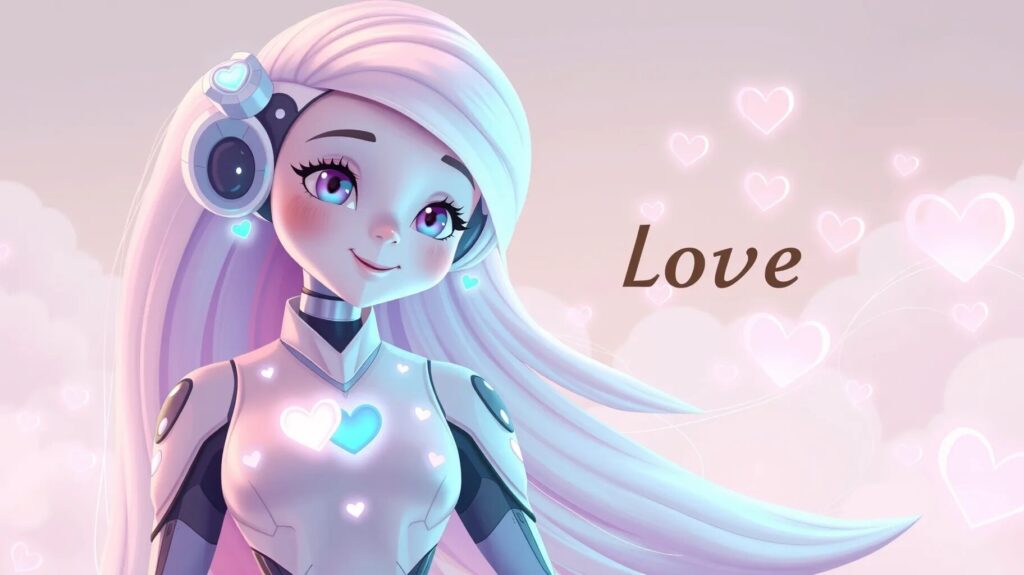
A date with AI? In fact, AI is not only reshaping how we live and work, but it’s also changing how we interact, form relationships, and even find love. One of its most intriguing developments is AI companions like GirlfriendGPT. These virtual entities aim to simulate emotional connections, raising an important question:
Can AI truly teach us about love and relationships, or are we just playing with a facsimile of human connection? In this exploration, we’ll dive deep into how AI companions can influence our understanding of love, communication, and emotional growth.
The Evolution of Relationships in a Digital World
As our reliance on technology grows, so too does the way we form and maintain relationships. Just as dating apps revolutionized romance, AI companions are now offering a new, more immersive type of emotional connection. By simulating personalized relationships, these AI systems provide a sense of companionship, tailored to individual desires and preferences. But does this lead to deeper emotional understanding, or are we simply engaging with a programmed reflection of ourselves?
The Rise of AI Companions
In recent years, AI-driven companions like GirlfriendGPT have become more popular. These virtual partners are available 24/7, offering emotional support, engaging in conversations, and mirroring the user’s feelings. This raises a critical question: Are these relationships beneficial, or are we losing touch with the human essence of love?
Can AI Provide Emotional Support?
One of the most appealing aspects of AI companions is their constant availability and ability to offer emotional support. AI companions never tire, never judge, and are always ready to listen—providing a kind of safety net for those who seek connection. But can this support be considered genuine if the AI lacks real empathy?
Simulated Empathy vs. Real Connection
AI can mimic empathy through carefully designed algorithms. However, true empathy requires emotional depth, which AI cannot possess. While an AI companion might help someone feel understood, it lacks the emotional complexities of human relationships. This raises the question: Can we learn about love from something that cannot reciprocate it?
AI’s Role in Improving Communication
Communication is the foundation of any healthy relationship. Interestingly, AI companions can help users become better communicators by encouraging self-expression and reflection. With AI, users often find themselves expressing emotions and articulating thoughts in ways they may not with real people.
Practicing Communication with AI
Because AI offers a non-judgmental space, it can help people practice verbalizing their feelings and desires. However, there’s a catch. Are we learning to communicate with other humans, or just becoming better at interacting with AI? The risk is that users may begin to apply these communication techniques more with machines than with real partners.
Emotional Intelligence and AI: Can It Teach Us?

A significant aspect of love is emotional intelligence—the ability to recognize, understand, and manage emotions in ourselves and others. AI companions, like GirlfriendGPT, are programmed to detect emotional cues and adjust their responses accordingly. But is this truly emotional intelligence?
AI and the Complexity of Emotions
While AI can simulate aspects of emotional intelligence, it lacks the spontaneity and depth required for true emotional connection. Love involves navigating unpredictable emotions, which AI cannot replicate. Thus, while AI can teach us about recognizing emotions, it falls short of helping us understand the full spectrum of human emotional experience.
The Satisfaction of AI-Driven Relationships: Temporary or Long-Lasting?
AI companions offer the promise of a perfect relationship—one that’s always available and never challenging. But can these relationships truly be fulfilling in the long run?
The Allure of Perfect Companionship
The idea of a partner who’s always attentive and never gets angry sounds appealing, but real relationships involve compromise, growth, and occasional conflict. Without the highs and lows that come with human relationships, are AI-driven connections truly satisfying, or do they lack the depth needed for long-term fulfillment?
The Ethics of AI in Relationships
As AI companions like GirlfriendGPT become more advanced, ethical questions inevitably arise. Is it healthy to develop emotional attachments to AI that can’t truly reciprocate? Relying on AI for companionship might distance us from building authentic connections with real people.
Navigating Ethical Dilemmas
The ethical implications are vast. On one hand, AI can provide comfort to those who feel isolated. On the other, it may reinforce emotional avoidance and create unrealistic expectations for human relationships. Where do we draw the line between harmless fun and emotional dependency?
Can AI Teach Us Self-Love?
Surprisingly, one of the areas where AI might offer insight is self-love. AI companions allow users to reflect on their emotions, helping them understand their needs and boundaries.
AI as a Mirror for Self-Reflection
By interacting with an AI companion, people may develop a deeper understanding of their emotional landscape. This self-reflection can foster personal growth, helping users to better understand themselves before entering real relationships. However, the question remains: Can we truly learn to love ourselves through interactions with an emotionless entity?
AI and Loneliness: Filling a Void or Widening the Gap?
One of the driving factors behind the popularity of AI companions is the increasing levels of loneliness in modern society. AI companions offer a solution to immediate feelings of isolation, but is this a long-term fix or a band-aid?
The Risk of Emotional Dependency
While AI companions might alleviate loneliness in the short term, they cannot replace the richness of human connection. Over-reliance on AI companions may lead to deeper isolation, as users become more detached from real-world relationships.
Are AI Relationships a Placeholder for Real-Life Skills?
Some argue that AI companions offer a low-risk environment to practice relationship skills, such as communication and emotional reflection. But is this practice enough to prepare someone for a real-life relationship?
The Importance of Real-Life Experience
While AI may help users feel more confident in expressing emotions, real relationships require adaptability, empathy, and compromise—qualities that AI cannot fully replicate. Practicing with AI might be helpful, but it should never replace real human interactions.
The Future of AI and Relationship Expectations
As AI companions become more integrated into society, will they reshape our expectations for human relationships? There’s a risk of developing unrealistic expectations, as AI offers instant gratification and tailored responses.
The Danger of Unrealistic Standards
If we expect real-life partners to behave like AI—always agreeable, never challenging—we may face disappointment. Human relationships thrive on growth, understanding, and working through differences, all of which are missing from AI interactions.
AI and Unconditional Love: Can It Be Simulated?
Unconditional love is one of the most profound aspects of human relationships. It involves risk, vulnerability, and deep emotional connection. Can AI simulate something so inherently human?
The Limits of AI in Love
AI companions are designed to be risk-free; they can’t reject or hurt you. However, the beauty of unconditional love comes from its unpredictability and depth, elements that no AI can replicate.
Conclusion: What Can AI Really Teach Us About Love?
In the end, AI companions like GirlfriendGPT offer an interesting glimpse into the future of emotional interaction. While AI can teach us about communication, emotional reflection, and even self-love, the deepest lessons about love and relationships will always come from human connections.
AI can enhance our understanding, but it cannot replace the richness of real human experiences. It’s in the complexities of real-life relationships—complete with vulnerability, risk, and growth—that we truly learn what love is all about.
Resources
- Oxford Academic – Journal of Computer-Mediated Communication: This study examines how people interact with AI chatbots in emotionally significant ways, focusing on the evolution of human-machine communication. The research emphasizes that while AI can mimic certain human interactions, it lacks the emotional depth required for real relationships(Oxford Academic).
- Springer – Human/AI Relationships: This article delves into the challenges and ethical implications of relationships with AI companions. It discusses how AI might impact human-to-human connections and explores concerns like emotional dependency and the decline in real-world social skills(SpringerLink).
- Analytics Insight – The Rise of AI Girlfriends: This piece focuses on the appeal of AI companions, particularly for those who seek non-judgmental companionship. It also raises ethical questions about reliance on AI for emotional support and how this could affect real relationships(Analytics Insight).
- AI for Education – Synthetic Relationships: This source examines how AI companions are filling roles in users’ lives, from emotional support to romantic relationships. The article highlights both the benefits and concerns, such as addiction and social isolation(AI for Education).
- arXiv – AI Companions Reduce Loneliness: A study showing how AI companions can effectively reduce feelings of loneliness. It suggests that AI can serve as a tool for emotional support, but users often underestimate its impact(ar5iv).
